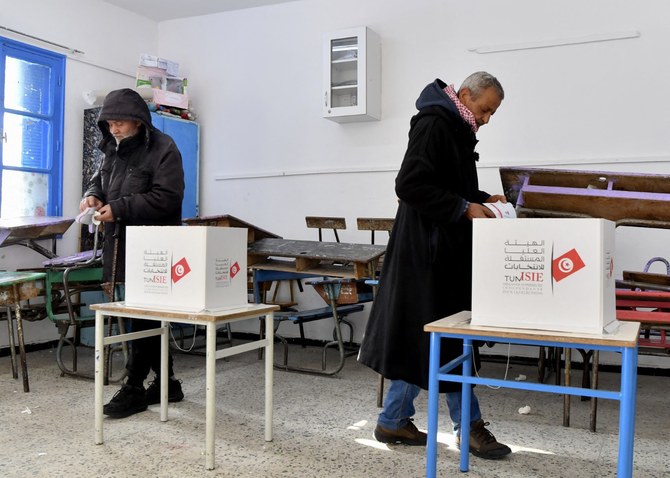
Tunisians were on Monday expected to approve giving the president unfettered powers, ending the country’s stumbles towards democratic rule and capping the turbulent decade across the region known as the Arab spring.
As voters trickled to the polls for the referendum, the country that birthed the revolts that rocked the Middle East seemed resigned to a return to pre-revolution autocracy, with a declining economy and political sclerosis sounding the death knell for hopes of widespread reform and free elections that would empower citizens.
President Kais Saied is now likely to cement a new constitution that gives him more control over a country he has ruled by decree since suspending parliament and installing emergency rule a year ago.
There was no minimum level of participation for the measure to pass and the electoral commission put preliminary turnout at only 27.5%.
Soon after an exit poll was published by Sigma Conseil indicating a ‘yes’ vote of 92.3%, hundreds of Saied supporters flocked to the central Habib Bourguiba Avenue to celebrate.
“Sovereignty is for the people”, “The people want to purify the country” they chanted, dismissing concerns over a return to autocracy.
The referendum generated few ripples across a region that is still regrouping after 10 years of direct challenges to the foundations of its autocracies, which sparked a groundswell of hope that citizens, rather than autocrats, could shape their own destinies.
As revolutions were overturned by military coup in Egypt, by Saudi intervention in Bahrain and – eventually – by Gulf support for Syria’s government, Tunisia was seen as the last hope among the moves to reset the contract between citizen and state, and redefine how politics was done in the Middle East.
Saudi Arabia and the United Arab Emirates have emerged as supporters of Saied, who now appears to have a clear path to transforming the country’s governance from a hybrid parliamentary system to a presidential model that gives him a vicelike grip on the country.
“Tunisia is a clear example of how the perspectives of the international leadership on democratic transition are distorted at best,” said Nancy Okail, a human rights advocate and CEO of the Centre for International Policy. “Although Tunisia was on the right track of political reform, the economic challenges coupled with corruption had been ringing the alarm bells well before Saied’s presidency. A power grab was his answer to the challenges.
Advertisement
“The regional dynamics 11 years on are certainly not promising,” she added. “The transactional relationship between the west and the region, prioritising oil, with a narrow view of security and the normalisation of relations with autocrats are only making things worse.
“The failures and fragility of these states in the midst of the food crisis and alarming global economic trends and climate crisis will increase the likelihood of further conflicts in the region, which will set us back to a situation that is far more dangerous than 11 years ago.”
Many voters seemed oblivious to the content of the referendum, or unconcerned by the wide-ranging powers it gave the country’s president. Apathy and fatigue had become constants in Tunisia’s political discourse, which had been beset by corruption and economic woes over the course of several democratically elected governments.
While many view Saied’s moves as a nail in the coffin of the Arab spring, other observers say change on such a scale needs a generational and historical perspective.
“Of course, today’s referendum in Tunisia is a setback for the rooting of a democratic culture in Tunisia,” said HA Hellyer, a non-resident scholar at the Carnegie Endowment for International Peace. “But the history of revolutionary change across the world is like that: a step forward, a step back, and so on. Tunisia, and frankly the Arab world, is no different.
“The factors that led to 2010 and 2011 remain and are wider, in Tunisia, but also wider across the region. We don’t measure revolutionary change in years, we look at it over decades and even longer.
“It’s hardly surprising it’s been difficult in Tunisia, a country that suffered from autocracy and authoritarianism for so long. You don’t come out of that without scars and forces that are keen to hold back progress in the name of populism. We see that kind of populist imperative in the UK and the US, and they haven’t had all the scars to deal with.”












